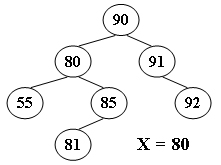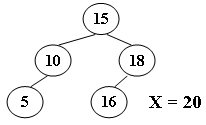18-19年期中考试试卷
and have the same speed of growth.
If keys are pushed onto a stack in the order {1, 2, 3, 4, 5}, then it is impossible to obtain the output sequence {3, 4, 1, 2, 5}.
If there are less than 20 inversions in an integer array, then Insertion Sort will be the best method among Quick Sort, Heap Sort and Insertion Sort.
For a sequentially stored linear list of length , the time complexities for query and insertion are and , respectively.
In a binary search tree, the keys on the same level from left to right must be in sorted (non-decreasing) order.
The recurrent equations for the time complexities of programs P1 and P2 are:
- P1: , ;
- P2: , ;
Then the best conclusion about their time complexities is:
To delete p from a doubly linked list, we must do:
Given input {15, 9, 7, 8, 20, -1, 4}. If the result of the 1st run of Shell sort is {15, -1, 4, 8, 20, 9, 7}, then the initial increment must be:
In-order traversal of a binary tree can be done iteratively. Given the stack operation sequence as the following:
push(1), push(2), push(3), pop(), push(4), pop(), pop(), push(5), pop(), pop(), push(6), pop()
Which one of the following statements is TRUE?
How many leaf node does a complete binary tree with 2435 nodes have?
Suppose that an array of size m is used to store a circular queue. If the head pointer front and the current size variable size are used to represent the range of the queue instead of front and rear, then the maximum capacity of this queue can be:
Given input { 4321, 56, 57, 46, 28, 7, 331, 33, 234, 63 }. Which one of the following is the result after the 1st run of the Least Signification Digit (LSD) radix sort?
Given a quadtree(四叉树) with 4 nodes of degree 2, 4 nodes of degree 3, 3 nodes of degree 4. The number of leaf nodes in this tree is __.
For an in-order threaded binary tree, if the pre-order and in-order traversal sequences are B E A C F D and A E C B D F respectively, which pair of nodes' left links are both threads?
The result of performing three DeleteMin operations in the min-heap {1,3,2,12,6,4,8,15,14,9,7,5,11,13,10} is:
For the quicksort implementation with the left pointer stops at an element with the same key as the pivot during the partitioning, but the right pointer does not stop in a similar case, what is the running time when all keys are equal?
Among the following sorting methods, which ones will be slowed down if we store the elements in a linked structure instead of a sequential structure?
- Insertion sort; 2. Selection Sort; 3. Bubble sort; 4. Shell sort; 5. Heap sort
Insert { 3, 8, 9, 1, 2, 6 } one by one into an initially empty binary search tree. The post-order traversal sequence of the resulting tree is:
The function is to find the K-th smallest element in a list A of N elements. The function BuildMaxHeap(H, K) is to arrange elements H[1] ... H[K] into a max-heap. Please complete the following program.
ElementType FindKthSmallest ( int A[], int N, int K )
{ /* it is assumed that K<=N */
ElementType *H;
int i, next, child;
H = (ElementType *)malloc((K+1)*sizeof(ElementType));
for ( i=1; i<=K; i++ ) H[i] = A[i-1];
BuildMaxHeap(H, K);
for ( next=K; next<N; next++ ) {
H[0] = A[next];
if ( H[0] < H[1] ) {
for ( i=1; i*2<=K; i=child ) {
child = i*2;
if ( child!=K && (3分) ) child++;
if ( (3分) )
H[i] = H[child];
else break;
}
H[i] = H[0];
}
}
return H[1];
}
| 序号 | 结果 | 测试点得分 |
|---|---|---|
| 0 | 编译错误 | 0 |
| 1 | 未作答 | 0 |
The function is to sort the list { r[1] … r[n] } in non-decreasing order. Unlike selection sort which places only the minimum unsorted element in its correct position, this algorithm finds both the minimum and the maximum unsorted elements and places them into their final positions.
void sort( list r[], int n )
{
int i, j, mini, maxi;
for (i=1; i<n-i+1; i++) {
mini = maxi = i;
for( j=i+1; (3分); ++j ){
if( (3分) ) mini = j;
else if(r[j]->key > r[maxi]->key) maxi = j;
}
if( mini != i ) swap(&r[mini], &r[i]);
if( maxi != n-i+1 ){
if( (3分) ) swap(&r[mini], &r[n-i+1]);
else swap(&r[maxi], &r[n-i+1]);
}
}
}
You are supposed to output, in decreasing order, all the elements no less than X in a binary search tree T.
Format of function:
void Print_NLT( Tree T, int X );
where Tree is defined as the following:
typedef struct TreeNode *Tree;
struct TreeNode {
int Element;
Tree Left;
Tree Right;
};
The function is supposed to use Output(X) to print X.
Sample program of judge:
#include <stdio.h>
#include <stdlib.h>
typedef struct TreeNode *Tree;
struct TreeNode {
int Element;
Tree Left;
Tree Right;
};
Tree BuildTree(); /* details omitted */
void Output( int X ); /* details omitted */
void Print_NLT( Tree T, int X );
int main()
{
Tree T;
int X;
T = BuildTree();
scanf("%d", &X);
Print_NLT( T, X );
printf("End\n");
return 0;
}
/* Your function will be put here */
Sample Output 1 (for the tree shown in Figure 1):
92 91 90 85 81 80 End

Figure 1
Sample Output 2 (for the tree shown in Figure 2):
End

Figure 2
void Print_NLT( Tree T, int X ) {
return;
}a.c: In function ‘BuildTree’:
a.c:33:6: warning: ignoring return value of ‘scanf’, declared with attribute warn_unused_result [-Wunused-result]
scanf("%d", &n);
^~~~~~~~~~~~~~~
a.c:35:10: warning: ignoring return value of ‘scanf’, declared with attribute warn_unused_result [-Wunused-result]
scanf("%d", &x);
^~~~~~~~~~~~~~~
a.c: In function ‘main’:
a.c:52:5: warning: ignoring return value of ‘scanf’, declared with attribute warn_unused_result [-Wunused-result]
scanf("%d", &X);
^~~~~~~~~~~~~~~| 测试点 | 结果 | 测试点得分 | 耗时 | 内存 |
|---|---|---|---|---|
| 0 | 答案错误 | 0 | 5.00 ms | 316 KB |
| 1 | 答案正确 | 1 | 4.00 ms | 384 KB |
| 2 | 答案错误 | 0 | 5.00 ms | 356 KB |
| 3 | 答案正确 | 1 | 4.00 ms | 324 KB |
| 4 | 答案错误 | 0 | 5.00 ms | 400 KB |